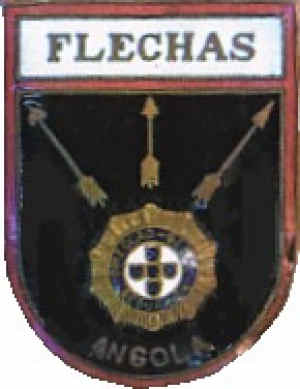Special Forces: Portuguese Selous Scouts (Flechas) of Angola & Mozambique
[I was talking to a Colonel in the Rhodesian army about the Portuguese in Angola and Mozambique. He had this to say about the Portuguese. Jan]
Hi Jan,
You are partially right. Portuguese conscripts (from metropolitan Portugal) did not have their heart in the African wars. Thus their performance as soldiers was below par. They did, however, raise units such as the Flechas (akin to the Selous Scouts) who had some good successes against terrorists. There are many other factors that could be mentioned, but the Portuguese lost their African possessions when the political character of Portugal changed following Salazar’s death. The wars were costing Portugal more than the government was prepared to sustain, so a political solution was to divest Portugal of their colonies. The sad reality is that Portugal handed over government to the internal political parties in Mozambique and Angola that were supported by the communist states, and fashioned themselves on Cuba.
Regards,
[The real thing, as I see it, with the Portuguese is that the Portuguese did not really grasp the importance of what they were fighting for. Their low morale is something that came to haunt the South Africans to a degree in the 1980s. The (((Liberals))) constantly chipping away at the morale of the whites … breaking their spirit… That is something that affects all whites, and we need to turn it around. Whites need to know the importance of what they are doing, they need to believe in themselves and they need to have the spirit and determination to do it.
I went and investigated the Flechas and was impressed. I noticed that many of them where khoisan people, bushmen. In Namibia and South Africa the bushmen always sided with the whites. The bushmen hate the blacks. The blacks murdered them and drove them down through Africa for centuries. Bushmen therefore always happily fought in white armies. The Bushmen were totally loyal to the whites and often used their excellent hunting and tracking abilities. I did not know that the bushmen were fighting for the Portuguese too!
This confirms, even my current view, that in Africa, we whites can still play many games. We’re far from finished.
What saddens me TREMENDOUSLY, is that the Portuguese, in a moment of weakness, threw away their entire empire when in fact, it was succeeding. Terrible. A disaster for them, and a disaster for all us whites in Africa – a disaster, even for our race. We must never just throw away territory that was obtained through blood, sweat and tears. Blood and Soil – that works for our race and has always done so. NEVER GIVE UP YOUR TERRITORY EASILY! NEVER! NEVER! NEVER!!!!Jan]
Flechas
| Flechas | |
|---|---|
| Active | 1967-1975 |
| Country | Portuguese Angola, Portuguese Mozambique |
| Allegiance | |
| Branch | Security forces |
| Type | Special Forces |
| Role | Special Reconnaissance, Raids, Counter-Terrorism, Tracking, and Bushcraft |
| Part of | PIDE / DGS |
| Engagements | Portuguese Colonial War |
| Commanders | |
| Notable commanders |
Oscar Cardoso |
The Flechas (Portuguese for Arrows) were a special forces unit of the Portuguese secret police (PIDE) that operated in Angola and Mozambique during the Portuguese Colonial War. Unlike most of the other Portuguese special forces that were employed in the several theatres of operations of the conflict, the Flechas were not a military unit but a police unit.
Flechas were organized as platoon-sized units consisting of local tribesmen and rebel defectors who specialised in tracking, reconnaissance and pseudo-terrorist operations. They sometimes patrolled in captured uniforms and were rewarded with cash bounties for every guerrilla or guerrilla weapon they captured.
History
Flechas units were created and employed in Angola under the command of the PIDE (renamed DGS in 1969). Composed of locally recruited men, often former guerrilla fighters but mostly bushman khoisan, the units specialised in tracking, reconnaissance and pseudo-terrorist operations.[1] The Flechas were employed with great success in the Frente Leste campaign in Eastern Angola in the early 1970s. General Costa Gomes argued that African soldiers were cheaper, knew the terrain better, and were better able to create a relationship with the local populace, a tactic that predates the ‘hearts and minds‘ strategy later used by United States forces in Vietnam at the time. Flechas units also operated in Mozambique at the very end stages of the conflict, following the dismissal of Kaúlza de Arriaga on the eve of the Portuguese coup in 1974. The units were to continue to cause problems for the FRELIMO even after independence and Portuguese withdrawal, when the country splintered into civil war.[2]
Organization and Equipment
They were initially created and organized by the PIDE Sub-Inspector Oscar Cardoso and first saw action in the remote areas that the Portuguese called Terras do Fim do Mundo (Lands of the End of the World) – the eastern region of Angola. The Flechas were organized in Battle Groups of about 30 men, although the formation was often loose. They were equipped with some of the equipment in use in the Portuguese Army, but most troops used weapons captured from the guerrillas and some used traditional weapons like bows and spears.
Their best known uniform item was the Boina Camuflada (camouflage beret), which became one of its symbols.
Other SF Units
There were, in fact, a number of Portuguese special forces units that were unique to the Portuguese Colonial War:
- Special Groups (Grupos Especiais): units similar to the ones used in Angola
- Paratrooper Special Groups (Grupos Especiais Pára-Quedistas): units of volunteer black soldiers that had paratrooper training
- Combat Tracking Special Groups (Grupos Especiais de Pisteiros de Combate): special units trained in tracking
Source: https://ipfs.io/ipfs/QmXoypizjW3WknFiJnKLwHCnL72vedxjQkDDP1mXWo6uco/wiki/Flechas.html

